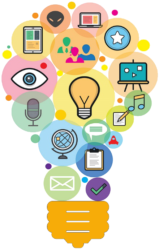Saturday, December 12, 2015
10:30 PST, 11:30 MST, 12:30 CST, 13:30 EST
UPDATE: This webinar was a huge success! See the recording on our Free recordings of IDL SIG webinars for members page. (requires password. Contact programs@stcidlsig.org if you did not yet receive your password.)
Please join the STC Instructional Design and Learning SIG for our first ever Virtual Progression – a new adventure in delivering bite-sized learning to our members and other interested attendees at a time and place that suits you.
Register on Eventbrite and plan to join us on December 12th.
What is a virtual progression?
A regular in-person progression lets you pick two or three of a number of simultaneous sessions and you have to miss the other “x” number of sessions. If you have attended the STC Summit you also know that these sessions are not recorded so once they have happened, they are history. Our virtual progression offers an advantage over this model, because if you attend one session or two sessions in the “progression” you will receive links to recordings for all four sessions.
How does it work?
We will have two presentations happening simultaneously, followed by a second set of two presentations. Instead of asking our presenters to repeat themselves, these sessions will only occur once… but again, even if you attend only one, you can listen to all four!
We recognize it’s a busy time of the year, so this will be short and sweet; over the holiday period, you’ll have lots of time to catch the other recordings.
Schedule
The schedule starts at 10:30 AM Pacific (11:30 AM Mountain, 12:30 PM Central, 1:30 PM Eastern) – log on a few minutes early so we can start on time. When you register, pick one of the two EARLY options and one of the two LATER options. Each session will last 20-25 minutes with time for Q&A afterwards.
The second session starts at 11:15 AM Pacific (12:15 PM Mountain, 1:15 PM Central, 2:15 PM Eastern)
Pricing
Sessions are FREE for IDL SIG Members; $10 per session for non-SIG STC members; $15 per session for non-STC members. (Remember, it’s only $10 to join the SIG if you are already an STC member… what a great time to join our SIG!)
Session Descriptions
Mellissa Ruryk presenting on 9 Things You Didn’t Know (you need to know) about Word
This is a presentation suited for beginning technical writers or more advanced ones who keep getting stumped by Word’s idiosyncrasies. We can almost guarantee everyone will learn at least one thing about Word, no matter how long you’ve been using it. Mellissa is co-manager of the IDL SIG and has worked with Word since version 3.0 (and before that she was a Wordperfect maven. At plenty-nine, she’s been around for a while!).
Robert Hershenow presenting on Audio Editing Tips: 3 Easy Steps to Improved Voice Recording
You might have recorded audio before for some of your training videos and been a bit disappointed in how you sounded. Or, you’ve never recorded before but want to learn tips so you know what to do right, from the very start. Robert can help you! Robert is co-manager of the IDL SIG and learned his audio chops as a radio engineer, recording studio owner and musician – including appearances as one of the Rough Drafts (at the STC Summit 2013 and 2014).
Scott McCoy presenting on The Mentor Board (cue echoing fadeout: MENTOR BOARD MENTOR Board Mentor board mentor board)
You’ve heard about the Mentor Board before but think it doesn’t have much to do with you. In fact, the Mentor Board won’t function without you, and it’s one of those cases (again) where you get back way more than what you put in. Mentoring is a way to grow – not just the next gen of technical communicators but also yourself. (Ever heard the adage that you don’t really know something until you can teach it to someone else?) In addition, others have already registered as mentors and you can gain more than you can imagine when you connect as a mentee (one who is mentored). Either way, listen to Scott as he tells you the whys and wherefores. Scott is the Mentoring team lead for the SIG.
Robert Hershenow presenting on the STC Body of Knowledge (TCBOK)
Here is the quick’n’dirty guide to becoming published in (or at least, increasing the odds of contributing to) STC’s BoK: our storehouse of knowledge of all things Tech Comm). He is going to cover what you need to know to get started, and where you can learn more. Robert is a member of the Technical Communication Body of Knowledge (TCBOK) task force.
Register now
Register now and bring a friend – there will be lots of room for everyone. One lucky registrant, drawn at random, will win a $25 AMAZON gift certificate simply for registering and attending. See you there!
Register on Eventbrite and plan to join us on December 12th.

 All STC community scholarships are currently under study by STC. Therefore, the Instructional Design and Learning SIG will not be offering scholarships in 2016.
All STC community scholarships are currently under study by STC. Therefore, the Instructional Design and Learning SIG will not be offering scholarships in 2016.